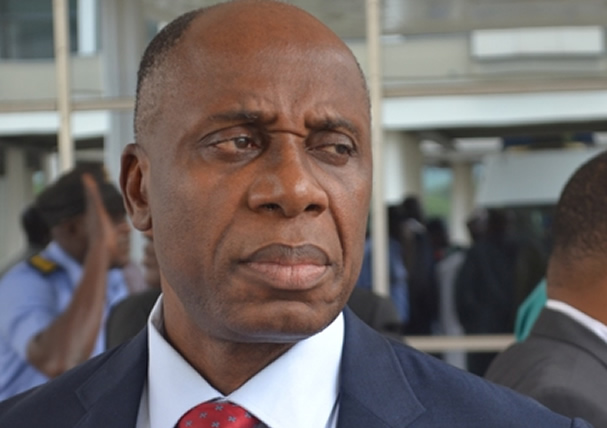The Erosion of Constitutionalism and the Rise of Executive Overreach
Rotimi Amaechi, a former governor of Rivers State and ex-minister of transportation, has delivered a scathing critique of the current political landscape in Nigeria, highlighting what he perceives as a dangerous trend of constitutional breaches and the weakening of democratic institutions. Speaking at the Akinjide Adeosun Foundation’s Annual Leadership Discourse, Amaechi centered his argument on the suspension of Rivers State Governor Siminalayi Fubara, his deputy, and state lawmakers, an action he deems illegal and unconstitutional. He attributed this alleged overreach to a confluence of factors, primarily the weakness of the National Assembly and a docile followership that allows such actions to go unchecked.
Amaechi argues that the concept of "fearless leadership" becomes relevant only in the context of a failed system. In a functioning democracy with robust institutions, the system itself should provide checks and balances, rendering the need for individual heroism less critical. He emphasizes the importance of adhering to the rule of law and the principle of separation of powers as cornerstones of good governance. The former governor posits that the current situation in Rivers State, where an elected governor was suspended and replaced by a military administrator, exemplifies a disregard for these fundamental principles. He contends that such actions represent not just a breach of law, but a more profound violation of the sanctity of the Constitution, which he likens to the "Bible of a country."
Amaechi’s critique extends beyond the specific incident in Rivers State to encompass a broader concern about the erosion of constitutionalism in Nigeria. He argues that the president’s actions in Rivers State constitute a clear breach of the Constitution, a document that should be held sacred and inviolable. The fact that such a breach occurred without significant public outcry, he suggests, points to a troubling complacency among the Nigerian populace. This "docility of followership," as he terms it, creates an environment where leaders can act with impunity, undermining the very foundations of democratic governance. He urges Nigerians to be more proactive in holding their leaders accountable and resisting any actions that threaten the constitutional order.
The former governor’s remarks underscore the fragility of democratic institutions in Nigeria and the ever-present danger of executive overreach. He paints a picture of a system where the rule of law is increasingly being replaced by the whims and caprices of individual leaders. The weakness of the National Assembly, according to Amaechi, further exacerbates this problem by failing to provide the necessary oversight and checks on executive power. This institutional weakness, coupled with a passive citizenry, creates a fertile ground for authoritarian tendencies to flourish. Amaechi’s warning serves as a call to action for Nigerians to defend their constitutional rights and demand accountability from their leaders.
The implications of Amaechi’s argument are far-reaching. If the National Assembly fails to fulfill its constitutional role as a check on executive power, and if the citizenry remains passive in the face of constitutional breaches, the very fabric of Nigerian democracy could be at risk. The arbitrary exercise of power by the executive branch, unchecked by other branches of government or by a vigilant public, could lead to a gradual erosion of democratic norms and the eventual consolidation of authoritarian rule. Amaechi’s warning serves as a stark reminder of the importance of upholding constitutional principles and the need for active citizen participation in safeguarding democratic values.
The situation in Rivers State, as described by Amaechi, serves as a microcosm of the broader challenges facing Nigerian democracy. The suspension of the elected governor and his replacement by a military administrator represent a clear departure from democratic norms and a potential precedent for future abuses of power. The lack of a robust response from the National Assembly and the apparent indifference of the public raise serious questions about the future of democratic governance in Nigeria. Amaechi’s call for a more engaged and proactive citizenry underscores the crucial role that ordinary Nigerians must play in defending their democracy against the encroachment of authoritarianism. The future of Nigeria’s democratic experiment may well depend on the ability of its citizens to heed this call and hold their leaders accountable to the principles enshrined in the Constitution.


